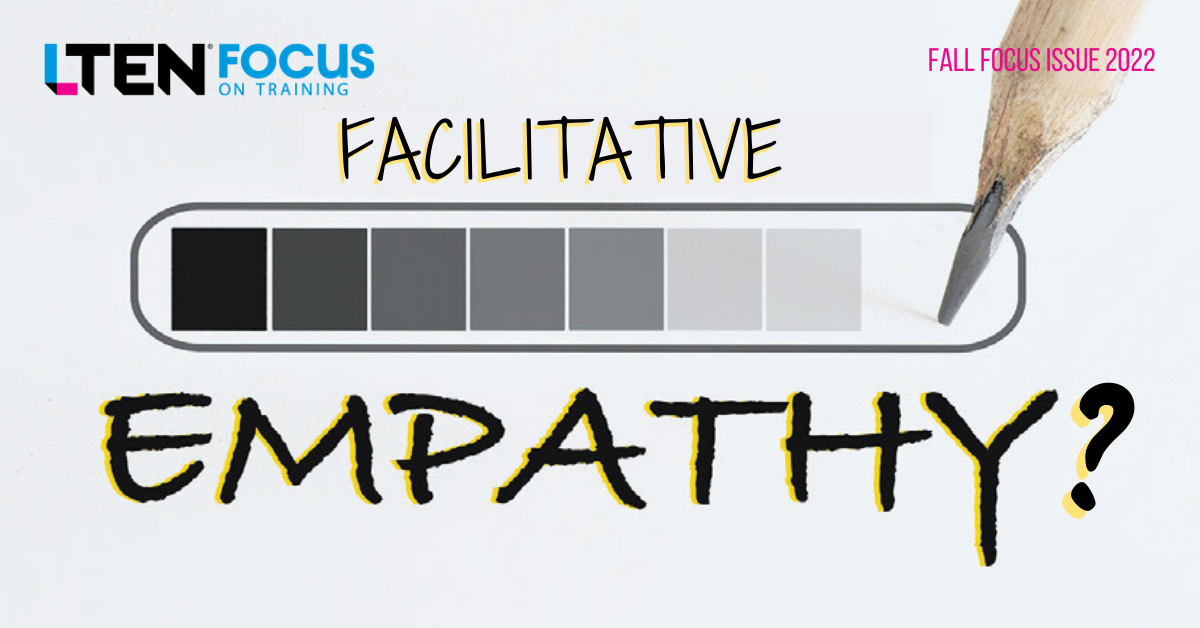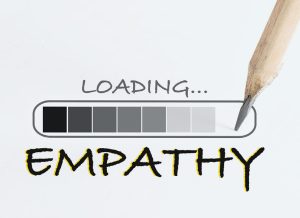
FRONT OF THE ROOM – Brian Lange
The power of feeling – of emotion – is compelling
 I’ve been thinking about the concept of “shaping” the learning experience for our audience members. It has caused me to land on a term that I’ve labeled (created?): “Facilitative Empathy.” Let me explain.
I’ve been thinking about the concept of “shaping” the learning experience for our audience members. It has caused me to land on a term that I’ve labeled (created?): “Facilitative Empathy.” Let me explain.
There has been much work done around the role of empathy in the workplace — how it can help us to connect with and collaborate better with our coworkers. It can be a powerful skill that helps to suspend judgment and focus intimately on the other, resulting in a connection that brings people closer. Empathy itself has been described as “the ability to understand and share the feelings of another.”
Feelings. Now that’s a word that I don’t think I’ve seen come up in an instructional design course outline or within any of the various taxonomies that exist. And yet, the power of feeling – of emotion – is compelling. Interestingly, a popular insight about professional selling is that neuroscience shows that people often don’t buy on logic — they buy on emotion. Author Michael Harris elaborated that “the decision to buy is made subconsciously” and our “intuitive decision to buy is then communicated to the conscious mind via an emotion.”
Model Empathy
Turning to the process of launching a learning session, think about how we have been taught to do this: Outline learning objectives; provide an agenda; establish speaker credibility; identify “ground rules.” This strikes me as very focused on reason.
So, logically, I can see where you’re wanting to go, and it can make sense to me, and perhaps I may even see the need for your content. But what about that idea that people “buy” on emotion? If I’m to buy into your content, wouldn’t the same neuroscience results apply to me as a learner? Maybe there’s some opportunity to start thinking about how to emotionally engage me to your content. Maybe you can model some facilitative empathy?
This brings me back to the need for us to be even more creative and thoughtful about how we put our openings together. I’ve written it before: “Just because you have a workshop to deliver doesn’t mean your audience cares.”
- How are we going to shape the experience of the learner, to pull them into our content so that they might care and connect?
- How can we ignite the feelings of our audience members so that their learning journey can begin in an untypical fashion — one in which their senses and synapses come to life, resulting in a possible sense of anticipation and commitment?
Start With the Familiar
We know our own experience best. So, one of the most straightforward ways to connect with our audiences is to build off what they know: Get them thinking about a particular experience in their life (a challenging sales call, a “difficult” person, a lost opportunity, an achievement, etc.) and connect it to your content. Show that you want to explore some ways to maximize the potential of situations like that. Create some hope. They can feel that.
Another way to get your audience to emotionally connect to your content is to share an opening story — or reference an article/book — that takes them somewhere. Pull them into the story (helpful to have an obstacle or protagonist) so that they might be interested — and then bridge to how you see a connection between that article/story and the potential for the content you’re about to explore.
Conclusion
It’s helpful to have empathy for what will transpire for those in your audience. Look at their empty seat and imagine what the journey they will undertake will look like in your session. Are they simply going to be a passenger on the predetermined route you are taking, or are they going to be an active co-creator, willing to contribute more of themselves to the outcome? Which feels like a more desirable option?
Try bringing some more facilitative empathy to your deliveries. Logically, it makes sense.
Brian Lange is with Perim Consulting and serves as lead facilitator for LTEN PrimeTime! For Trainers Core and Masters Workshops. Email Brian at blange@perim.com.








